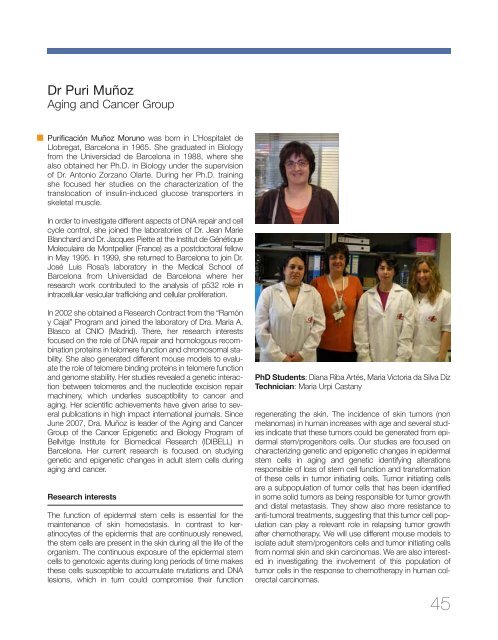PEBC Report - Programa de Epigenética y BiologÃa del Cáncer
PEBC Report - Programa de Epigenética y BiologÃa del Cáncer
PEBC Report - Programa de Epigenética y BiologÃa del Cáncer
You also want an ePaper? Increase the reach of your titles
YUMPU automatically turns print PDFs into web optimized ePapers that Google loves.
Dr Puri Muñoz<br />
Aging and Cancer Group<br />
Purificación Muñoz Moruno was born in L’Hospitalet <strong>de</strong><br />
Llobregat, Barcelona in 1965. She graduated in Biology<br />
from the Universidad <strong>de</strong> Barcelona in 1988, where she<br />
also obtained her Ph.D. in Biology un<strong>de</strong>r the supervision<br />
of Dr. Antonio Zorzano Olarte. During her Ph.D. training<br />
she focused her studies on the characterization of the<br />
translocation of insulin-induced glucose transporters in<br />
skeletal muscle.<br />
In or<strong>de</strong>r to investigate different aspects of DNA repair and cell<br />
cycle control, she joined the laboratories of Dr. Jean Marie<br />
Blanchard and Dr. Jacques Piette at the Institut <strong>de</strong> Génétique<br />
Moleculaire <strong>de</strong> Montpellier (France) as a postdoctoral fellow<br />
in May 1995. In 1999, she returned to Barcelona to join Dr.<br />
José Luis Rosa’s laboratory in the Medical School of<br />
Barcelona from Universidad <strong>de</strong> Barcelona where her<br />
research work contributed to the analysis of p532 role in<br />
intracellular vesicular trafficking and cellular proliferation.<br />
In 2002 she obtained a Research Contract from the “Ramón<br />
y Cajal” Program and joined the laboratory of Dra. Maria A.<br />
Blasco at CNIO (Madrid). There, her research interests<br />
focused on the role of DNA repair and homologous recombination<br />
proteins in telomere function and chromosomal stability.<br />
She also generated different mouse mo<strong>de</strong>ls to evaluate<br />
the role of telomere binding proteins in telomere function<br />
and genome stability. Her studies revealed a genetic interaction<br />
between telomeres and the nucleoti<strong>de</strong> excision repair<br />
machinery, which un<strong>de</strong>rlies susceptibility to cancer and<br />
aging. Her scientific achievements have given arise to several<br />
publications in high impact international journals. Since<br />
June 2007, Dra. Muñoz is lea<strong>de</strong>r of the Aging and Cancer<br />
Group of the Cancer Epigenetic and Biology Program of<br />
Bellvitge Institute for Biomedical Research (IDIBELL) in<br />
Barcelona. Her current research is focused on studying<br />
genetic and epigenetic changes in adult stem cells during<br />
aging and cancer.<br />
Research interests<br />
The function of epi<strong>de</strong>rmal stem cells is essential for the<br />
maintenance of skin homeostasis. In contrast to keratinocytes<br />
of the epi<strong>de</strong>rmis that are continuously renewed,<br />
the stem cells are present in the skin during all the life of the<br />
organism. The continuous exposure of the epi<strong>de</strong>rmal stem<br />
cells to genotoxic agents during long periods of time makes<br />
these cells susceptible to accumulate mutations and DNA<br />
lesions, which in turn could compromise their function<br />
PhD Stu<strong>de</strong>nts: Diana Riba Artés, Maria Victoria da Silva Diz<br />
Technician: Maria Urpi Castany<br />
regenerating the skin. The inci<strong>de</strong>nce of skin tumors (non<br />
melanomas) in human increases with age and several studies<br />
indicate that these tumors could be generated from epi<strong>de</strong>rmal<br />
stem/progenitors cells. Our studies are focused on<br />
characterizing genetic and epigenetic changes in epi<strong>de</strong>rmal<br />
stem cells in aging and genetic i<strong>de</strong>ntifying alterations<br />
responsible of loss of stem cell function and transformation<br />
of these cells in tumor initiating cells. Tumor initiating cells<br />
are a subpopulation of tumor cells that has been i<strong>de</strong>ntified<br />
in some solid tumors as being responsible for tumor growth<br />
and distal metastasis. They show also more resistance to<br />
anti-tumoral treatments, suggesting that this tumor cell population<br />
can play a relevant role in relapsing tumor growth<br />
after chemotherapy. We will use different mouse mo<strong>de</strong>ls to<br />
isolate adult stem/progenitors cells and tumor initiating cells<br />
from normal skin and skin carcinomas. We are also interested<br />
in investigating the involvement of this population of<br />
tumor cells in the response to chemotherapy in human colorectal<br />
carcinomas.<br />
45


